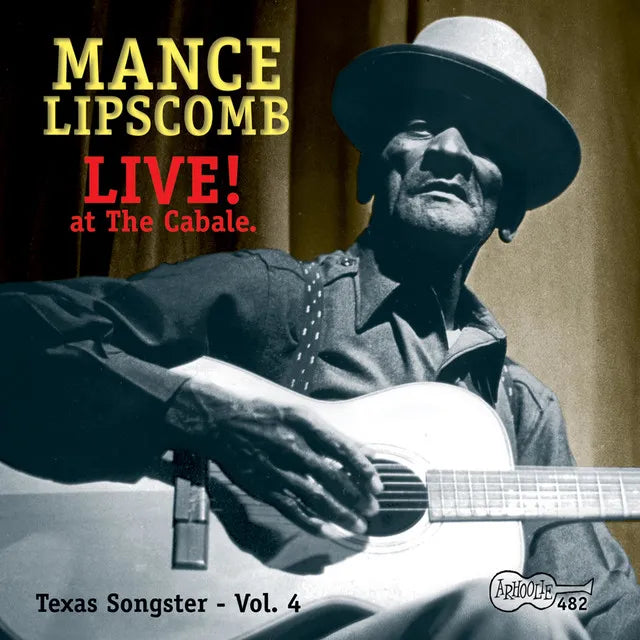Who is Mance Lipscomb? A Brief Career Overview
Meet Mance Lipscomb, a true titan of the Texas blues scene! Born Beau De Glen Lipscomb on April 9, 1895, in the heart of Navasota, Texas, this remarkable artist is celebrated not just as a singer and guitarist, but as a songster whose musical repertoire has captivated audiences for generations. Mance's style intertwines elements of country blues, Texas blues, and traditional blues, setting him apart in a genre often dominated by loud electric riffs and flashy performances. Instead, his intimate acoustic sound expresses profound emotions and rich storytelling.
Despite facing the challenges of a sharecropping lifestyle, Mance emerged as an artist of substantial influence in the American folk music revival of the 1960s. Discovering music later in life--his first recordings came in 1960--Mance's contributions to the music industry are profound. With a vast repertoire that spans over 90 songs, including classics like "Sugar Babe," he showcased his unique ability to blend blues, ballads, and traditional spirituals. Providing a rich connection to vinyl culture, Lipscomb's albums, especially those released on Arhoolie Records, are cherished gems within the vinyl community, inviting listeners to experience his artistry in its most authentic form.
Mance Lipscomb's Early Life and Background
Mance Lipscomb's journey began in a modest setting where music became a refuge. Born to a father who had been born into slavery and a mother of mixed African American and Native American heritage, Mance was raised in a culture rich with musical tradition. His childhood was marked by hardship when he left formal education after only the third grade, dedicating himself to help his family in the fields. It was during this time that his mother gifted him a guitar - a turning point that ignited his passion for music.
Mance learned to play by ear, absorbing the sounds of his environment and teaching himself various songs. Local gatherings, known as "Saturday night suppers," were where he first shared his music, honing his skills in front of friends and neighbors. These formative experiences not only instilled a deep connection to his roots but also laid the groundwork for his future in music. Although he didn't touch the recording scene until his 60s, the musical foundation formed in his early years remained pivotal throughout his life.
The Musical Influences That Shaped Mance Lipscomb's Sound
Mance Lipscomb's music was enriched by a diverse array of influences. He drew inspiration from legendary artists such as Leadbelly and Mississippi John Hurt, whose storytelling and guitar techniques became woven into his own style. Mance's music reflects a blend of country blues and traditional folk, characterized by a distinctive finger-picking style often referred to as "dead-thumb." This accompaniment technique became a hallmark of his play, offering a backdrop for his resonant, emotive voice.
During his formative years, Mance admired influential vinyl records that shaped his artistic expression. As he curated his sound, he embraced all genres, from spirituals to pop standards, showcasing a musical versatility that echoed through his work. Mance's eclectic tastes influenced his songwriting, leading to a unique fusion of styles that still resonates with vinyl collectors today.
How Mance Lipscomb Entered the Music Industry
Though Mance Lipscomb's journey into the music industry might seem unconventional, it is a testament to his resilience and talent. His career ignited in 1960 when he was discovered by folklorist Mack McCormick and record producer Chris Strachwitz, who were captivated by his raw, authentic sound. Mance had undoubtedly paid his dues, performing tirelessly within his community for years, but his first recording, released as Texas Songster, marked a significant turning point.
As Lipscomb navigated his early days in the recording realm, he faced the challenges common to many artists--limited means of production and distribution. However, with the pioneering spirit of Arhoolie Records, Mance's music found its way onto vinyl. His subsequent recordings contained an alluring mix of country blues and traditional songs, capturing the essence of his life experiences. Each release further solidified his signature style and opened the door to coveted performances at prestigious festivals, where he shared stages alongside the likes of Bob Dylan and Joan Baez.
Mance Lipscomb's Breakthrough and Rise to Fame
The pivotal moment in Mance Lipscomb's career came with the release of his 1961 album, Trouble in Mind, which showcased his compelling storytelling and intricate guitar work. This album, available on vinyl, not only resonated with audiences but also became an essential reference within the blues genre. With songs that examined themes of love, life, and resilience, it garnered critical acclaim, leading to a surge in vinyl sales.
As he embraced newfound fame, Mance's presence at festivals solidified his reputation as a performer, celebrated for both his musical talent and relatable storytelling. This exposure brought invitations for larger tours and opportunities to perform at iconic venues. His ability to connect with audiences through poignant songwriting and captivating stage presence cemented his role as a beloved figure in the music community, influencing countless artists in the genres of blues and folk.
How Personal Life Shaped Mance Lipscomb's Music
Mance Lipscomb's personal life was intricately interwoven with his music, profoundly reflecting his experiences and struggles. The narrative of overcoming the harsh realities of his upbringing fueled his songwriting, enriching his lyrics with authenticity and depth. His relationships and interactions with fellow musicians, particularly the influential blind guitarist Sam Rogers, shaped both his friendships and his artistry.
Beyond relationships, Mance's involvement in his community revealed a commitment to social causes, often using his platform to advocate for change. He shared his own story of resilience through music, inspiring generations while shining a light on the challenges faced by African Americans. Notably, his autobiography, published posthumously, offers a rare glimpse into the heart and soul of this remarkable man, emphasizing how personal struggles informed his artistic journey. Despite facing public controversies, Mance emerged as a respected figure not only for his music but for the integrity he embodied throughout his life.





























